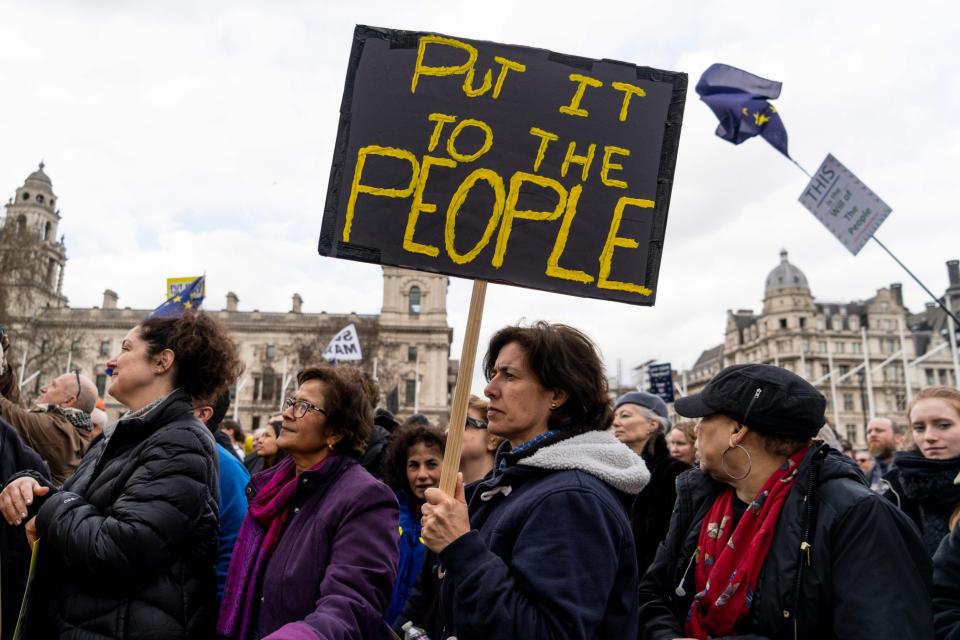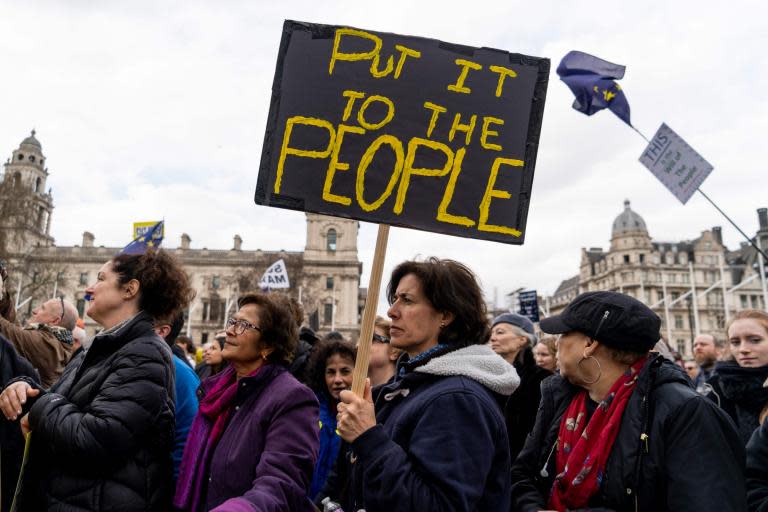Philip Hammond has seen the light on a second referendum – now parliament must back a Final Say on Brexit
It appears that the knives are out for the prime minister.
After yesterday’s Put It To The People march drew a million people to London calling for a second referendum, it should perhaps be no surprise that the momentum for change is growing. Indeed, with a petition demanding that Article 50 be revoked having now received over five million signatures, it would remiss of senior politicians to bury their heads in the sand.
Still, it is precisely that characteristic as displayed by Theresa May which has led to whisperings about her potential removal. The stubbornness which was once lauded as the thing that could win the day has long since become a serious liability.
The last seven days have truly been disastrous for the prime minister. First came John Bercow’s bold intervention to rule out a third vote on Ms May’s Brexit deal. Then came a badly misjudged appeal to the public on Wednesday, during which the PM attempted to pit ordinary people against members of parliament by blaming the latter for the present impasse. While it may be true that most people in Britain are fed up with Brexit, the speech smacked of desperation and of a complete failure of leadership.
A day later, bemused EU leaders granted a Brexit extension but privately expressed serious doubts as to Ms May’s ability to get her deal (or probably any deal) through the House of Commons, even with some additional time to play with.
By the end of Friday, even Downing Street sources were acknowledging that the prime minister wouldn’t seek a third vote on the current deal if she didn’t think it would pass – notwithstanding the possible procedural objection of the speaker. Debate thus moved on to the question of indicative votes and to the possibility of MPs rallying around an alternative plan. Who knows quite what the new week will bring, but the chances of the Commons agreeing on a new form of Brexit in a matter of days – when unity has proved elusive for nearly three years – feels slim. The EU would then need to back it anyway.
Would things be different if the government had a change of leadership? Evidently some in the cabinet believe they would (despite public protestations to the contrary), with the prospect of a future trade deal being negotiated by Ms May apparently enough to keep some MPs from supporting her withdrawal deal.
If that is so, then it is a terrible indictment of the mess we are in. Either the deal on the table is a good one or it is not, irrespective of what happens next and who is in charge in the months ahead. The two previous defeats of Ms May’s deal have been clear enough and it would frankly be the bitter icing on a foul cake if it were to be voted through purely on the promise of a prime ministerial resignation.
If talk of a caretaker replacement is so much deckchair rearranging on the Titanic disaster that is Brexit, then is it at least notable that one of the government’s most senior members has finally admitted that a second Brexit referendum “deserves to be considered”. That this should be the conclusion of the chancellor, Philip Hammond, who backed Remain during the original referendum, ought not to undermine its significance.
For month after month, the cabinet has sought to downplay talk that a second public vote could ever happen. It has been about the only thing that members of the government have been able to be united about – save for Amber Rudd saying in December that she could see the argument for one in the event that Ms May’s deal was rejected.
That of course is precisely where we are now. What’s more, it is far from clear whether any other form of Brexit will find consensus backing. And a no-deal departure would be the final shame in this most shameful of periods.
As such, and as a million voices made plain on Saturday, it is time for MPs to recognise that only a second referendum will give the government – or more probably a new administration – the kind of mandate needed to get the UK back on track, either by Brexiting in full knowledge of what that means, or by remaining in the EU.

 Yahoo News
Yahoo News 

